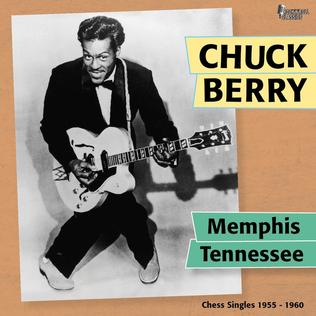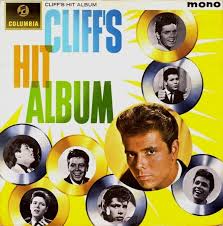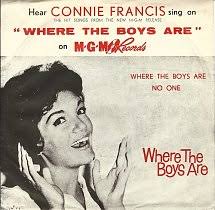Related Research Articles

Brenda Mae Tarpley, known professionally as Brenda Lee, is an American singer. Performing rockabilly, pop and country music, she had 47 US chart hits during the 1960s and is ranked fourth in that decade, surpassed only by Elvis Presley, the Beatles and Ray Charles. She is known for her 1960 hit "I'm Sorry" and 1958's "Rockin' Around the Christmas Tree", which has become a Christmas standard.

"Denise" is a song written by Neil Levenson that was inspired by his childhood friend, Denise Lefrak. In 1963, it became a popular top ten hit on the Billboard Hot 100 chart, when recorded by the American doo-wop group Randy & the Rainbows. A cover version by the American new wave group Blondie, re-titled "Denis", hit number 2 in the UK Singles Chart in 1978. Dutch actress and singer Georgina Verbaan covered "Denis" in 2002 and reached number 30 on the Dutch Singles Chart.
"December, 1963 " is a song originally performed by The Four Seasons, written by original Four Seasons keyboard player Bob Gaudio and his future wife Judy Parker, produced by Gaudio, and included on the group's album, Who Loves You (1975).

Lloyd Estel Copas, known by his stage name Cowboy Copas, was an American country music singer. He was popular from the 1940s until his death in the 1963 plane crash that also killed country stars Patsy Cline and Hawkshaw Hawkins. Copas was a member of the Grand Ole Opry.

"I Will Follow Him" is a popular song that was first recorded in 1961 by Franck Pourcel, as an instrumental titled "Chariot". The song achieved its widest success when it was recorded by American singer Little Peggy March with English lyrics in 1963. The music was written by Franck Pourcel and Paul Mauriat. It was adapted by Arthur Altman. The completely new English lyrics were written by Norman Gimbel.
"Blue Velvet" is a popular song written and composed in 1950 by Bernie Wayne and Lee Morris. A top 20 hit for Tony Bennett in its original 1951 version, the song has since been re-recorded many times, with a 1963 version by Bobby Vinton reaching No. 1.

"It's My Party" is a pop song that has been recorded by numerous artists since the 1960s. In 1963, American singer Lesley Gore's version hit number one on the pop and rhythm and blues charts in the United States. It was the first hit single for producer Quincy Jones.

"Can't Get Used to Losing You" is a song written by Jerome "Doc" Pomus and Mort Shuman, first made popular by Andy Williams in a 1963 record release, which was a number-two hit in both the US and the UK. Twenty years later, British band The Beat took a reggae re-arrangement to number three in the UK.

"Rhythm of the Rain" is a song performed by The Cascades, released in November 1962. It was written by Cascades band member John Claude Gummoe. On March 9, 1963, it rose to number 3 on the Billboard Hot 100, and spent two weeks at number 1 on Billboard's Easy Listening chart. Billboard ranked the record as the number 4 song of 1963.

"Da Doo Ron Ron" is a song written by Jeff Barry, Ellie Greenwich and Phil Spector. It first became a popular top five hit single for the American girl group The Crystals in 1963. American teen idol Shaun Cassidy covered the song in 1977 and his version hit number one on the Billboard Hot 100 chart. There have also been many other cover versions of this song, including one by the songwriters Jeff Barry and Ellie Greenwich themselves, performing as The Raindrops.

"Memphis, Tennessee", sometimes shortened to "Memphis", is a song by Chuck Berry, first released in 1959. In the UK, the song charted at number 6 in 1963; at the same time Decca Records issued a cover version in the UK by Dave Berry and the Cruisers, which also became a UK Top 20 hit single. Johnny Rivers's version of the song was a number two US hit in 1964.

"Just One Look" is a song co-written by American R&B singers Doris Troy and Gregory Carroll. The recording by Doris Troy was a hit in 1963. The Hollies, Anne Murray and Linda Ronstadt each achieved great success with the song. There have also been many other versions.

"When the Lovelight Starts Shining Through His Eyes" is a song written by Holland–Dozier–Holland and recorded in 1963 by Motown singing group The Supremes. It is notable as the Supremes' first Billboard Hot 100 Top 40 recording, following seven previous singles between January 1961 and September 1963 which failed to enter the Top 40. The single is also notable as the first Supremes single written and produced by Holland–Dozier–Holland, who had previously created hits for Martha and the Vandellas and Mary Wells.
"Busted" is a song written by Harlan Howard in 1962. It was recorded by Johnny Cash for Cash's 1963 album Blood, Sweat and Tears. It has been recorded by several notable artists, including Ray Charles and John Conlee (1982).
"Blue on Blue" is a popular song composed by Burt Bacharach with lyrics by Hal David, first recorded and released by Bobby Vinton in April 1963, backed by Burt Bacharach and his Orchestra. Vinton's single spent 13 weeks on the Billboard Hot 100 chart, peaking at No. 3 on July 6, 1963, while reaching No. 2 on Billboard's Middle-Road Singles chart. Vinton's single was a major hit in many other nations as well.

Cliff's Hit Album is Cliff Richard's first compilation album and ninth album overall. It was released in July 1963 and reached number 2 on the UK Albums Chart. The album contains 14 songs from his singles released between August 1958 and May 1962. It includes all Richard's singles in this period that made the top 3 of the UK Singles Chart.
"What Will Mary Say" is a song written by Eddie Snyder and Paul Vance. It was originally performed and issued as a single by Mark Dinning in 1961, but did not chart. Two years later, the song was recorded and released by Johnny Mathis, who made the song a popular hit. Mathis' version of "What Will Mary Say" reached #3 on the adult contemporary chart, #9 on the U.S. pop chart, #21 on the U.S. R&B chart, and #49 on the UK Singles Chart in 1963.

"No One" is a song originally recorded by Connie Francis in 1960. It was released as the B-side of her bigger hit, "Where the Boys Are," but charted separately. The song reached #34 on the U.S. Billboard Hot 100 during the winter of 1961.
References
- ↑ "Netherlands No.1s Hits 1960s" . Retrieved 30 September 2014.